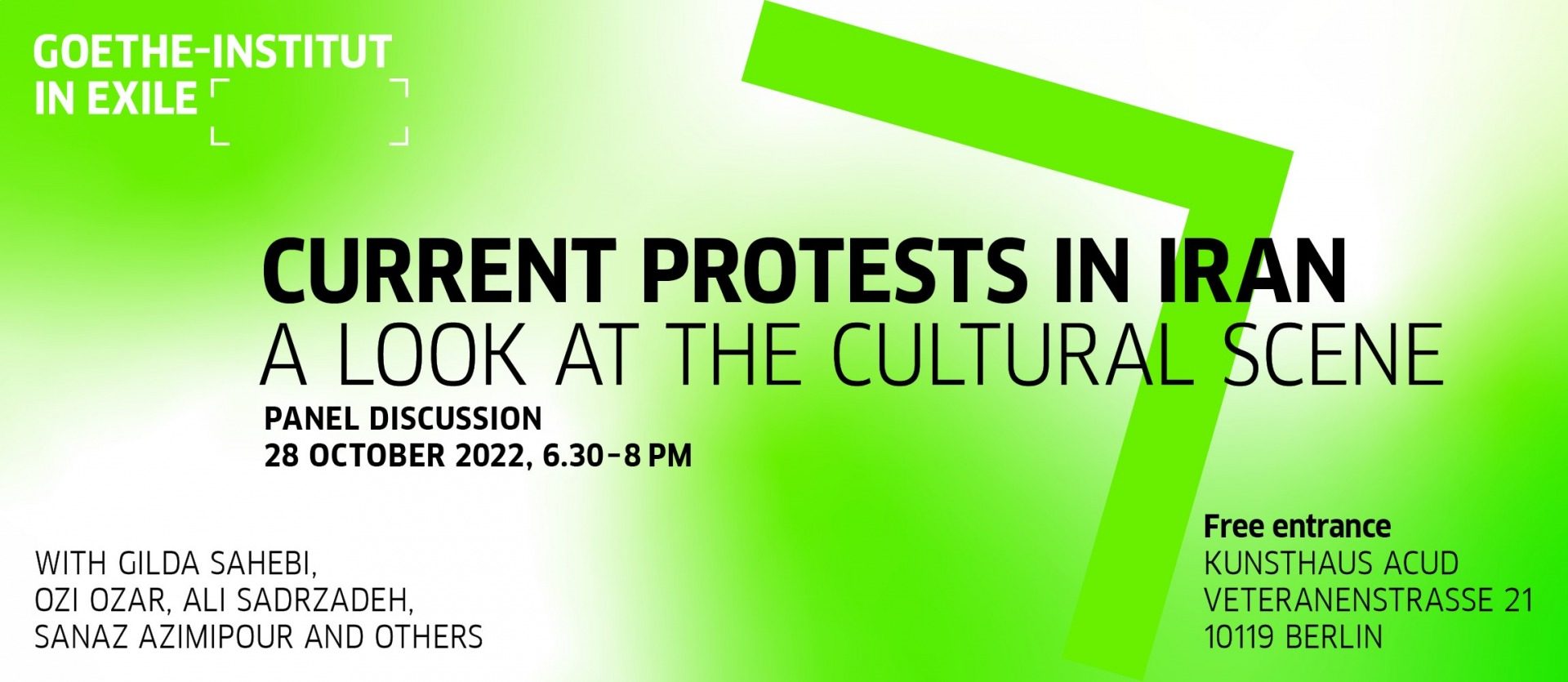Goethe-Institute Im Exil: CURRENT PROTESTS IN IRAN. A LOOK AT THE CULTURAL SCENE
Panel Discussion
FR 28.10, 18:30H - 20H
ACUD Studio
"Women - Life - Freedom": The current protests in Iran were triggered by the violent death of the young Kurdish woman Mahsa Amini in police custody, she was arrested because of an allegedly ‘incorrectly’ fitted headscarf. Quite quickly, however, the protests changed from the question about the compulsory headscarf to a general frustration with the ruling regime and its corrupt treatment of the population. Already described by some analysts as a revolution, these protests have now taken on a nationwide dimension and encompassed many areas of society. The government's response is open violence; there are numerous eyewitness reports and recordings of arbitrary acts of violence, many demonstrators have been arrested, and fatal shootings of crowds by paramilitary groups have also been documented.
Abroad, the perception of these protests is partly clouded by political agendas; the negotiations on the nuclear agreement have only very hesitantly led to a clear condemnation of the violent repression by some Western governments, and sanction measures were decided quite late[SO1] . On the other hand, the Iranian communities of the diaspora, as part of the civil society, are very active and play a major role both in the visibility of the protest in Europe and the psychological support of the protesters in Iran. Numerous demonstrations, social media activities and public interventions are strengthening the pressure on governments to position themselves even more clearly.
The cultural scenes are also involved in the protests. Many prominent cultural workers in Germany and other countries, but also in Iran itself, have expressed their solidarity, undertaken support measures and taken a public position. But what role can they play beyond that? What possibilities do cultural workers and cultural institutions in Germany have to advocate for a change in the political situation in Iran? What responsibility do cultural institutions in general have towards cultural workers from such illiberal and authoritarian contexts? What roles can Iranian exile communities play in this context? How can new pressure groups also emerge from culture? And what can foreign cultural policy actually achieve in an authoritarian context such as Iran?
These questions and issues will be discussed and analysed in the panel.
PARTICIPANTS
Gilda Sahebi (journalist, doctor)
Gilda Sahebi is a trained doctor and studied political science. She works as a freelance journalist focusing on anti-Semitism and racism, women's rights, the Middle East and science. She completed her journalistic training at Bayerischer Rundfunk. After her traineeship, she was an author and editor for the ZDF programme "Neo Magazin Royale". She then worked as a project manager for the "No Hate Speech Movement" at Neue deutsche Medienmacher*innen. She is a writer for the taz and works for ARD, among others.
Ozi Ozar (Theatre professional)
Ozi Ozar, born in Tehran, is a queer artist living in Berlin and Frankfurt am Main. Ozi Ozar studied theatre and film direction in Tehran and dramaturgy in Frankfurt. Ozi Ozar's artistic approach revolves around comedy, interactive theatre and the translation of social media functions into theatre and vice versa, focusing on the discourse of identity politics and queer-ness.
Sanaz Azimipour (Activist)
Sanaz Azimipour was born in Tehran and came to Germany to study. The co-founder of ‘MigLoom’, a migrant self-organization association, and the initiative ‘Not without us 14%’, which demands political participation of first-generation migrants, fights against racism and discrimination in Germany.
Ali Sadrzadeh (Journalist)
Ali Sadrzadeh works as an editor for hr-iNFO. After graduating from high school and teacher training, he worked as a teacher in Tehran. In 1970 he came to Germany to study psychology and engineering in Kiel and then German and political science in Frankfurt. He returned to Iran in 1980. He worked for DPA and the Frankfurter Rundschau, and since 1984 for the hr. Ali Sadrzadeh was ARD correspondent in North Africa from 1990 to 1994.
Moderation: Marc-André Schmachtel (Goethe-Institut, Cultural Department)
